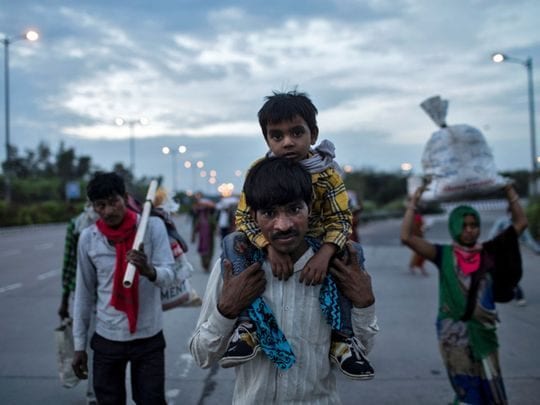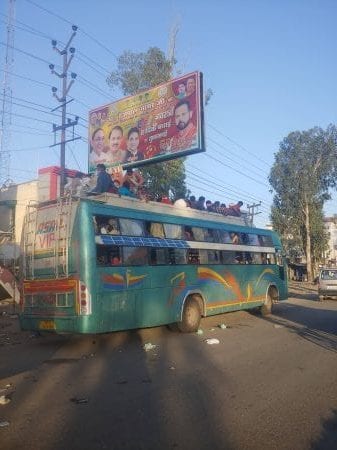
With ₹3 in his pocket, this worker plans to walk 700 kms to reach home
Three rupees — that's how much 37-year-old Nand Kishore, a daily-wage construction worker, has in his possession while walking on foot to cover a distance of nearly 700 kilometres to Madhya Pradesh from Noida in Uttar Pradesh.

Three rupees — that’s how much 37-year-old Nand Kishore, a daily-wage construction worker, has in his possession while walking on foot to cover a distance of nearly 700 kilometres to Madhya Pradesh from Noida in Uttar Pradesh.
“I don’t know whether I’ll get food along the way or whether I’ll die walking,” said Kishore, who is amongst tens of thousands of migrant labourers forced to walk hundreds of kilometres to their native villages with dashed hopes and empty pockets.
When Prime Minister Narendra Modi announced a nationwide lockdown to curb the spread of the deadly coronavirus on Tuesday, he failed to take into account the fate of millions of daily-wage labourers, who often travel to cities from remote villages in search of work.
Related news | COVID-19 has unmasked India — the poor are on their own
With all non-essential businesses shut, these workers had no means to earn and soon ran out of money. Those who could manage to find temporary shelter are forced to live in tiny rooms in Delhi and Uttar Pradesh accommodating dozens of people, and those who could not are marching towards their homes — men armed with luggage, women with children, and old people with minimal hopes of making through.
Little do they know that even if they do manage to reach the border of their state, they will not be allowed to enter as state borders are sealed. In either scenario, social distancing, a strategy repeatedly sought by Modi, is a privilege they just cannot afford.
A sea of migrants thronged Anand Vihar Inter-State Bus Terminal, Delhi on Saturday after Uttar Pradesh Chief Minister Yogi Adityanath announced that 1,000 buses have been deployed to help workers reach their respective destinations. Devastating images of lakhs of workers struggling to hop onto overcrowded buses did their rounds on social media and many who could not board one were seen walking to Lal Kuan bus terminal in Greater Noida.

“At least 100 buses are running today (Sunday) until 6 pm from Lal Kuan to Etawah, Kanpur, Lucknow, and other towns and cities in Uttar Pradesh,” said M P Sinha, a police officer.

However, upon reaching the site, one could see barely 15 buses and at least 5,000 people stranded, with more coming in. Every bus was carrying at least 200 people in total, inside the bus as well on its roof. Buses were then stopped and people were thrashed by the Uttar Pradesh police to make them disperse.
“My children have been starving for the past two days. Hunger will claim our lives before the coronavirus,” said 34-year-old Gomti Yadav, with two make-shift cloth bags – one wrapping her luggage and another holding her two-year-old son.
Her eight-year-old daughter, who had already been walking for six hours straight, will have to cover rest of the distance to Kanpur from Greater Noida without her mother and brother along with 15 other people in their group.
Some people, who had managed to hire tempos to towns and cities in UP, were deboarded by the police and forced to walk to their destination. “We hired a tempo since we (40 people) are travelling with 13 children, mostly below the age of 10, to Jalalabad from Greater Noida. The police beat us with batons to get us off the tempo. We could not even get our money back, and now we are travelling with children in our arms and no money in hand,” said 42-year-old Naresh Rathod, adding that they were all asked to vacate their rented rooms despite the district magistrate of Gautam Buddh Nagar in UP issuing orders that no landlord should demand rent from tenants for a month or ask them to vacate the property if they failed to pay up.
Related news | Migrant exodus may lead to an explosion of COVID-19 cases
No buses to Bihar
To add to our fellow countrymen’s dismay, there were no buses operating from Anand Vihar or Lal Kuan to Bihar, which is 1,200 kilometres away from Delhi. “We walked to Anand Vihar from Gautam Buddh Nagar only to be turned away, and will now walk to Bihar. Modi has failed us miserably. If only he arranged transport for millions like me before the lockdown…” said 43-year-old Naresh, who used to earn ₹300 a day working in a factory exporting garments.
Along with Naresh were at least a dozen other people impatient to reach home and worried if they would be able to. When told that the state borders had been sealed and that they should find temporary shelter in UP itself, most replied that they had no place to stay and minimal food to eat.
Related news | Migrants sprayed with ‘disinfectant’ upon return to UP, shows video
Although the government has announced a $22-billion bailout plan for the country’s poor that includes free food and cash handouts, besides shelter, many have been unable to avail of the benefit.
“I went to a shelter to get food but when I did not get any, I went to ISKCON temple for some,” said 38-year-old Gopal, a cycle-rickshaw driver. He has had to refuse rides to fellow migrants to nearby chowks because he is physically weak and unable to ride the cycle rickshaw. His rickshaw is currently his temporary home, apart from being his means of survival.
With the middle class rushing to grocery stores and the labour class walking endlessly to far-flung states, there is little doubt that the Centre did not plan enough before implementing the lockdown. One can only picture the consequence if one of the thousands of migrants is infected by the coronavirus. What will happen when they reach remote villages where even practising basic hygiene, let alone using masks or sanitisers, is not a norm?

